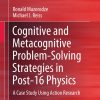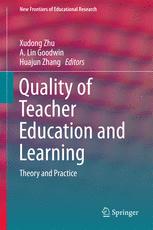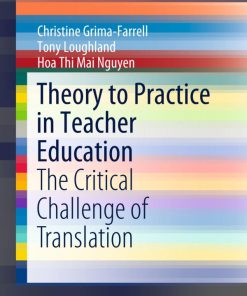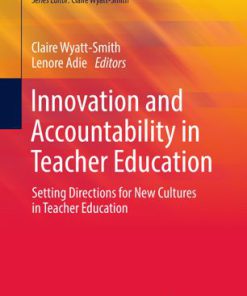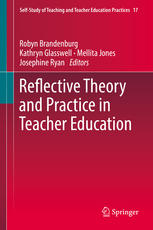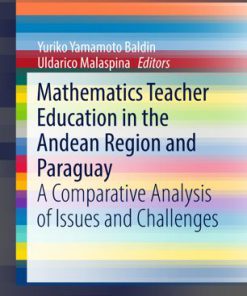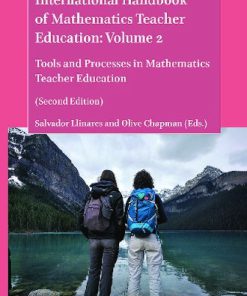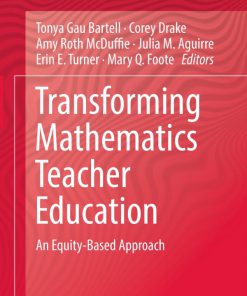Diagnostic Competence of Mathematics Teachers Unpacking a Complex Construct in Teacher Education and Teacher Practice 1st Edition by Timo Leuders, Kathleen Philipp, Juliane Leuders 3319663272 9783319663272
$50.00 Original price was: $50.00.$25.00Current price is: $25.00.
Diagnostic Competence of Mathematics Teachers: Unpacking a Complex Construct in Teacher Education and Teacher Practice 1st Edition by Timo Leuders, Kathleen Philipp, Juliane Leuders – Ebook PDF Instant Download/DeliveryISBN: 3319663272, 9783319663272
Full download Diagnostic Competence of Mathematics Teachers: Unpacking a Complex Construct in Teacher Education and Teacher Practice 1st Edition after payment.
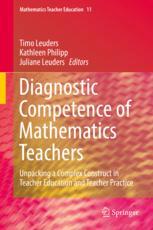
Product details:
ISBN-10 : 3319663272
ISBN-13 : 9783319663272
Author: Timo Leuders
This book examines the various areas of mathematics education and neighboring disciplines that have recently contributed to a better understanding of the still vague construct of diagnostic competence. The work addresses the nature, development and effect of diagnostic competence in mathematics instruction, with a focus on the professional development of teachers.
Diagnostic Competence of Mathematics Teachers: Unpacking a Complex Construct in Teacher Education and Teacher Practice 1st Table of contents:
Part I: The Nature of Diagnostic Competence: Conceptualizing and Measuring Facets of Diagnostic Comp
Diagnostic Competence of Mathematics Teachers: Unpacking a Complex Construct
1 Diagnostic Competence: A Relevant but Complex Construct
1.1 What Is Diagnostic Competence? Terminological Considerations and a General Model
1.2 Theoretical Approaches to Define the Construct of Diagnostic Competence
2 Research on Diagnostic Competence
2.1 Research from the Perspective of Diagnostic Dispositions (Knowledge, Beliefs, Motivation, Aff
2.2 Research from the Perspective of Diagnostic Thinking (Diagnostic Skills)
2.3 Research from the Perspective of Diagnostic Performance
References
Diagnostic Skills of Mathematics Teachers in the COACTIV Study
1 Introduction
2 The COACTIV Framework
2.1 Diagnostic Skills Assessed in COACTIV
2.1.1 Diagnostic Skills (D1–D8)
2.1.2 Competence Aspects Related to Diagnostic Skills
2.1.3 General Model of Diagnostic Competence
2.2 Instructional Quality and Student Characteristics
3 Results
3.1 Descriptive Results
3.2 Relationship Between Diagnostic Skills
3.3 School-Type Differences with Regard to the Mean Levels
3.4 Predictive Validity with Respect to Teaching Quality and Student Learning
4 Discussion
References
Competences of Mathematics Teachers in Diagnosing Teaching Situations and Offering Feedback to S
1 Introduction
2 Situation-Specific Tasks in Teacher Education and Research
3 Situation-Specific Task Design and the Tangent Task-N
4 Participants, Data Collection and Data Analysis
5 Results: Emergence of Four Characteristics
6 Illustration of the Four Characteristics Through the Data
6.1 Consistency
6.2 Specificity
6.3 Reification of Pedagogical Discourse
6.4 Reification of Mathematical Discourse
7 Discussion
References
Diagnostic Competence for Dealing with Students’ Errors: Fostering Diagnostic Competence in Err
1 Introduction
2 Diagnostic Competence in Error Situations
3 Modeling Teachers’ Diagnostic Competence in Error Situations
3.1 Modeling Diagnostic Processes
3.2 Modeling Diagnostic Competence in Error Situations in the Present Study
4 Fostering Diagnostic Competence in Error Situations
5 Development of the Pre- and Post-test and Analysis of the Data
5.1 Design of the Pre- and Post-test
5.2 Analysis of the Future Teachers’ Answers
6 Results
7 Conclusion
References
Factors Influencing the Accuracy of Diagnostic Judgments
1 Introduction
2 Factors Influencing Diagnostic Judgments
2.1 Models of Factors Influencing Diagnostic Judgment Accuracy
2.2 Social Biases and Group Specificity
2.3 Horizon Content Knowledge
2.4 Knowledge of Content and Students
2.5 Decompression of Tasks
2.6 Deliberative and Intuitive Decisions
3 A Heuristic for the Process of Diagnostic Judgments
4 Conclusion
References
Diagnostic Competences of Mathematics Teachers with a View to Processes and Knowledge Resources
1 Introduction: Diagnostic Competence
2 Theoretical Framework
2.1 Diagnostic Processes as an Alternation of Anchoring and Adjustment
2.2 Diagnostic Competences as Facet of Professional Knowledge for Teaching Mathematics
2.3 Diagnostic Processes as Unpacking Learning Goals
3 Investigating Processes and Knowledge Resources in Diagnostic Situations
3.1 Design
3.2 Data Analysis
3.3 Results
4 Discussion
References
Revealing and Promoting Pre-service Teachers’ Diagnostic Strategies in Mathematical Interviews w
1 Diagnostic Competence and Strategies
1.1 Perspectives on the Concept of Diagnostic Competence
1.2 Process-Oriented Approaches to Diagnostic Competence
2 Analyzing Diagnostic Strategies
2.1 Methods: Uncovering Individual Facets of Diagnosing
2.2 Results: Elements of Pre-service Teachers’ Diagnostic Strategies
2.2.1 Facets of Collecting Data
2.2.2 Interpreting and Concluding
2.2.3 Types of Strategies
2.2.4 Discussion: Facets of Diagnostic Strategies and Types
3 Promoting Diagnostic Strategies and Expertise in Pre-service Teacher Training
3.1 Features of Supportive Courses for Practicing Teachers
3.2 Promoting Pre-service Teachers’ Diagnostic Expertise
3.3 Implications for the Design of Courses for Promoting Pre-service Teachers’ Diagnostic Expe
3.3.1 Action and Reflection on Experienced Action
3.3.2 Supporting PCK with a Focus on KCS
3.3.3 Explicit Analyses of Personal Preconditions
4 Conclusions for Prospective Research
References
Part II: Developing Diagnostic Competence and Applying Diagnostic Competence in the Classroom: Model
Developing Diagnostic Competence Through Professional Learning Communities
1 Introduction
2 Teacher Knowledge
3 Teacher Practice
4 Professional Learning Communities
5 The DIPIP Project
6 Methods
7 Examples: PLC Conversations
8 Analysis: PLC Conversations
9 Analysis: Classroom Teaching
10 Conclusions
Appendix: Rubrics for Coding Teacher Knowledge
References
Supporting Mathematics Teachers’ Diagnostic Competence Through the Use of One-to-One, Task-Based
1 Introduction
2 The Use of Clinical Interviews in Mathematics in Australia
3 Two Large-Scale Research and Professional Learning Projects Involving Extensive Use of Assessmen
3.1 The Early Numeracy Research Project
3.2 Australian Catholic University (ACU) Rational Number Interview
3.3 Some Information on How the Interviews Were Administered and the Data Collected
3.4 Some Important Similarities and Differences with the Two Projects
4 Methodology
5 The Role of the Interview and Growth Points in Developing Teachers’ Diagnostic Competence in
5.1 A Clearer, Evidence-Based Understanding of Student Thinking in Mathematics and What Students
5.2 Realistic Mathematical Expectations of Students
5.3 An Understood Framework/Growth Points/Typical Learning Trajectory for Students in a Given Dom
5.4 Revelations About “Quiet Achievers” in the Classroom
5.5 Enhanced Subject Matter Knowledge and Pedagogical Content Knowledge
5.6 An Awareness of Common Strategies Used by Students
5.7 An Awareness of Common Difficulties and Misconceptions Demonstrated by Students
5.8 Improved Questioning Techniques, Including the Opportunity to See the Benefits of Increased
5.9 The Opportunity to Use Tasks from The Interview as Models or Inspirations for Developing Cl
6 The Use of the Early Numeracy Interview with Children with Down Syndrome
7 Conclusion
References
Diagnosing Learning Goals: An Often-Overlooked Teaching Competency
1 Introduction
1.1 Learning Goals Are More than Statements of Value
1.2 Diagnosing Is More than Assessing Students’ Learning
2 Setting the Stage for Treating Learning Goals as Empirical Objects
3 Empirically Testing and Improving Learning Goals
3.1 The Process at Work in Our Teacher Preparation Program
3.2 Summary
4 Can Preservice Teachers Diagnose Learning Goals?
5 Implications for Teacher Education
References
Improving Teachers’ Assessment Literacy in Singapore Mathematics Classrooms: Authentic Assessment
1 Introduction
2 Mathematics Curriculum Reforms and Authentic Assessment
3 Mathematics Teachers’ Professional Learning in Assessment
4 Professional Development in Authentic Assessment Task Design
5 Impact on the Quality of Teachers’ Assessment Tasks and Students’ Work
5.1 Quality of Mathematics Assessment Tasks
5.2 Quality of Student Work in Mathematics
6 Discussion and Recommendations
Appendix A
References
Developing Prospective Teachers’ Ability to Diagnose Evidence of Student Thinking: Replicating a
1 Introduction
2 Using Interventions to Improve the Prospective Teachers’ Ability to Diagnose Evidence of Stu
2.1 What Skills Can Be Learned by Prospective Teachers?
2.2 What Key Features Have Been Included in Successful Interventions?
2.3 What Further Research Is Needed?
2.4 Conceptualizing Diagnostic Competence
3 Previous Findings from Spitzer et al. (2011)
4 Methods
4.1 Participants
4.2 Measures and Analysis
4.3 Intervention
5 Results
5.1 Convergent Results
5.1.1 Evidence Consisting of Teacher Explanations
5.1.2 Evidence Containing Strictly Procedural Descriptions
5.2 Divergent Results
5.2.1 Evidence Irrelevant to the Learning Goal
5.2.2 Evidence Containing Strictly Procedural Descriptions
6 Discussion
6.1 Limitations
6.2 Conceptual Replication
References
Specific Mathematics Assessments that Reveal Thinking: An Online Tool to Build Teachers’ Diagnos
1 Introduction
1.1 Data Sources
2 The Designers’ Vision for the Smart-Test System
2.1 Items that Provide a Window into Student Thinking
2.2 Diagnosis from Patterns of Responses, Not Just Score
2.3 Reporting Developmental Stages and Misconceptions
3 Helping Teachers Transform Diagnostic Information into Formative Assessment
3.1 Appreciating Formative Assessment
3.2 The Provision of Feedback Directly to Students
4 Building Diagnostic Competence and Improving Teaching
4.1 Effect on Knowledge for Teaching
4.2 Effect on Teaching Practice
5 Conclusion
People also search for Diagnostic Competence of Mathematics Teachers: Unpacking a Complex Construct in Teacher Education and Teacher Practice 1st:
diagnostic mathematics assessment
diagnostic teaching pdf
mathematics competency
diagnostic math tests
mathematics diagnostic assessment quizlet
Tags: Diagnostic, Competence, Mathematics Teachers, Unpacking, Complex, Construct, Teacher Education, Timo Leuders, Kathleen Philipp, Juliane Leuders
You may also like…
Education Studies & Teaching - School Education & Teaching
International Research, Policy and Practice in Teacher Education: Insider Perspectives Jean Murray
Education Studies & Teaching
Quality of Teacher Education and Learning Theory and Practice 1st Edition Xudong Zhu
Education Studies & Teaching
Education Studies & Teaching
Uncategorized
Professionalism and Teacher Education Voices from Policy and Practice Amanda Gutierrez
Education Studies & Teaching - School Education & Teaching
Reflective Theory and Practice in Teacher Education 1st Edition Robyn Brandenburg
Education Studies & Teaching - School Education & Teaching
The Handbook of Mathematics Teacher Education Volume 2 2nd Edition Salvador Llinares
Education Studies & Teaching - School Education & Teaching
Transforming Mathematics Teacher Education An Equity Based Approach Tonya Gau Bartell


